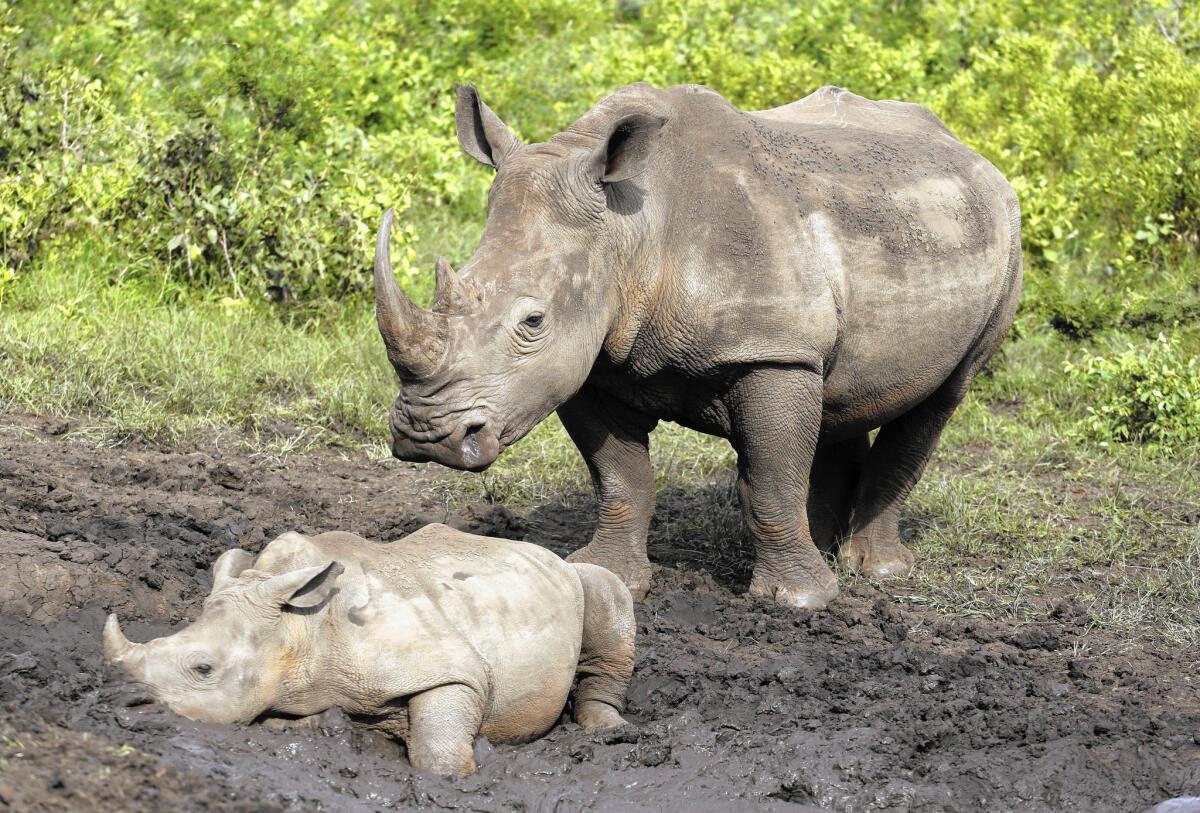South Africa reports a decrease in 2015 rhino poachings

- Share via
Reporting from JOHANNESBURG, South Africa — The number of rhinos poached in South Africa, home to 80% of the world’s population, fell marginally in 2015 after years of rising dramatically, according to newly released government figures.
There were 1,175 rhinos killed last year, down from 1,215 the previous year, leading the government to conclude that poaching had “stabilized” and that efforts to protect the animals were starting to work.
But experts said that conclusion was premature, given that it was based on a single year of data. They also suggested that efforts to protect rhinos in South Africa are driving poachers to neighboring countries.
In Namibia, 80 rhinos were killed in 2015, up from 25 the previous year, and in Zimbabwe, the total more than doubled to 50.
“The threat seems to be spreading across the region and you would expect that,” said Jo Shaw, rhino program manager at the World Wildlife Fund in Johannesburg. “It’s like a bubble. If you squeeze hard in one area, it will bulge in another area.”
“This is why we need to treat the problem systemically,” she said. “You can throw lots of money and time and effort into field security in priority rhino sites and we have to do that. But ultimately it is just going to shift the pressure elsewhere.”
The effort to protect rhinos in South Africa has been fueled by international donations and aid, including $23 million from American billionaire Warren Buffett and $3.75 million from the U.S. government in 2014. Other donors include the Netherlands and Sweden.
White rhinos are classified as a threatened species, while the rarer black rhino is critically endangered. It has been illegal under international treaty since 1977 to buy or sell their horns, which have long been prized in China, Vietnam and other Asian nations for use in traditional medicine, including curing hangovers and preventing illness.
Increasingly, the horn is also seen as a status symbol for wealthy elites and is used in jewelry.
In South Africa, a political battle is unfolding over a controversial strategy to save rhinos.
A group of private rhino owners argue that the international treaty — the Convention on Trade in Endangered Species, or CITES — should be modified to allow commerce in horns that are farmed. Horns grow like fingernails, only much slower, and can be harvested every seven years without harming the animals. In fact, horn removal has become a strategy for protecting rhinos in national parks by making them unattractive to poachers. The horns are stockpiled because they cannot be sold.
NEWSLETTER: Get the day’s top headlines from Times Editor Davan Maharaj >>
The farmers say that the proceeds from legal sales could help fund protection efforts.
But opponents say that horn farming would only feed demand, and that it would be difficult to distinguish illegal horns from legal ones.
The South African government set up a committee to report on rhino horn farming and trade. The next CITES meeting — where any changes to the treaty require approval — is scheduled this fall in South Africa.
The country is home to about 20,000 rhinos, including 5,000 or so that are privately owned and between 8,000 and 9,000 in Kruger National Park, where 826 were killed last year.
The battle against poaching in the park at times resembles a guerrilla war. On one side are nimble gangs of armed poachers, paid by international smuggling syndicates, that slip in and out of the park, mainly from Mozambique. On the other is the South African army, which is experimenting with the use of surveillance drones.
Edna Molewa, the environmental affairs minister, said Thursday that the country’s anti-poaching law enforcement efforts had improved, with 317 arrests in 2015, compared with 258 in 2014. All of the arrests last year were either in the park or just outside it.
On Tuesday, a court in Roodeport, outside Johannesburg, denied bail to four people — including three current or former police officers — charged with rhino poaching, money laundering and racketeering.
Michael Masutha, the justice minister, said 48 people were convicted of rhino poaching charges since April, including 24 sentenced to jail. In six cases, charges were dropped or the suspects were acquitted.
Shaw, of the World Wildlife Fund, said more prosecutions are needed in the Asian countries where rhino horns ultimately end up. This month, CITES called on Vietnam to produce evidence on the number of prosecutions for rhino horn use.
“In Asia, what we are seeing is a carrot approach, with calls on people not to use rhino horn,” Shaw said. “What we’re not seeing is the stick. There’s an occasional arrest of a rhino horn smuggler. There are no arrests of the people selling horn and no arrests of the consumers themselves.”
“These are the guys paying huge amounts of money, who are driving what’s going on in South Africa.”
Follow @RobynDixon_LAT for news from Africa.
NEWSLETTER: Get the day’s top headlines from Times Editor Davan Maharaj >>
ALSO
Diplomats prep for Syria peace talks scheduled in Geneva next week
British inquiry finds Putin probably OKd ex-spy Litvinenko’s poisoning
Israel plan could lead to more Jewish settlements in occupied West Bank
More to Read
Sign up for Essential California
The most important California stories and recommendations in your inbox every morning.
You may occasionally receive promotional content from the Los Angeles Times.








